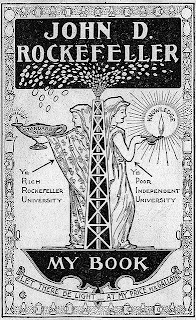The Senate investigates:
"There is much that we don't know," the Iowa Democrat said, citing gaps in the data surrounding graduation and employment rates, spending, and student-loan defaults.
The industry starts to clean up its act:
Partnerships collapseAs federal scrutiny of for-profit colleges tightens, two prominent proprietary institutions have decided to discontinue the practice of enrolling students who do not have a high-school diploma or a GED but who pass a basic-skills test that allows them to qualify for federal student aid.
California's community-college system has canceled a controversial agreement that would have allowed students at some colleges to earn credit for discounted online courses at Kaplan University.The two colleges are Corinthian and Kaplan. Kaplan is part of the Washington Post empire and the only part that is profitable. Recently, and I am sure there is no connection, the Post came out in favor more private education and less regulation of the same.
The 112-campus community-college system is severely overcrowded, and officials saw the November agreement as a way to make it easier for students to get classes they need. For Kaplan, the agreement promised a boost of credibility and a ready pool of new students, who would be able to take certain online courses at a 42-percent discount.
But at a time of intense scrutiny of for-profit colleges, the arrangement between the nation's largest public-college system and a prominent for-profit college drew complaints from faculty groups and others. Critics argued the system was endorsing Kaplan, and they said it could be difficult for students who transferred to the state's public universities to receive credit for Kaplan courses.
. . .
Some who had criticized the agreement cheered the decision to cancel it, saying that even at a discount, the Kaplan courses were a bad deal for students. Community-college courses in California cost $26 per credit hour, the lowest in the country, while Kaplan's discounted courses would have cost about $216 per credit hour.
Image via.
There is a, no doubt better, discussion of the same issue here.

No comments:
Post a Comment